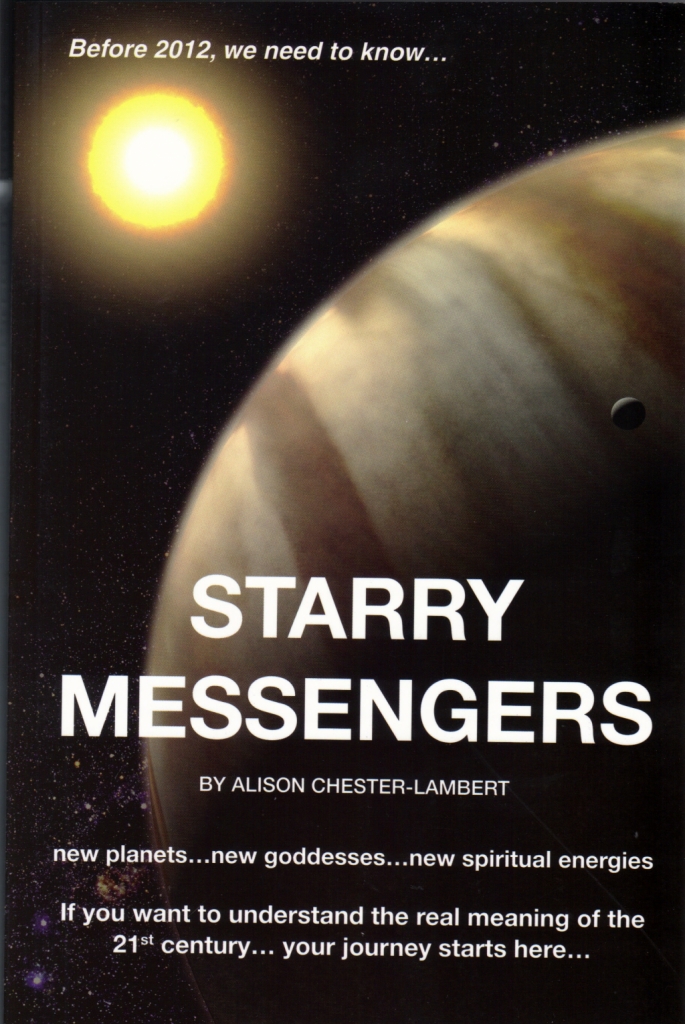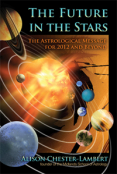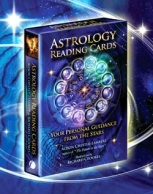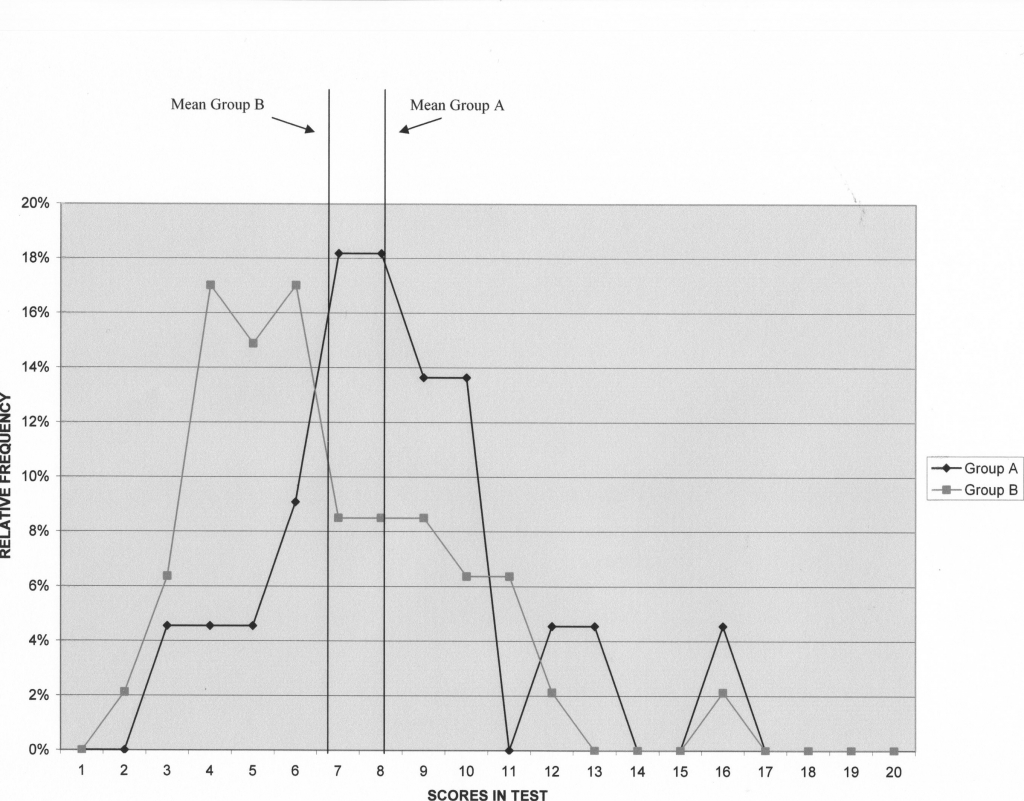Private Readings
Astrology readings any where in the World
Only £120 for 90mins via Skype.
Call 07767 810889 if you are in the UK or e-mail alison@alisonchesterlambert.com for elsewhere
For more information on Alison's readings or to see what people say about her click here
To watch a video trailer about the Astrology Reading Cards click on the image
Starry Messengers
Alison's first book was a limited first edition and that has now sold out. But it was re-published as the `Future in the Stars` and there are still a few personally signed copies of this for sale.
See the `Publications For Sale` page
on this website

TThe Future in the Stars
See the Publications for Sale page
on this website to buy this

Click here to see review of
`Future in the Stars`
in Paradigm Shift
Click here to read a review of
`Future in the Stars`
on the RealAstrologers website
|
an Astrological Cognitive Psychology research paper comparing the recollection ability of participants with a Mercury Neptune aspect in their horoscope to those with no aspect
Mercury, Neptune and the Ability to Recall
by Alison Chester-Lambert
This research was undertaken as part of a cognitive psychology under-graduate course overseen by Stafford University in 2004. It was awarded a distinction and was subsequently published in Correlation Journal of Research in Astrology in 2009
ABSTRACT
Almost everything we do depends on our ability to remember the past. This experiment sought to contribute quantitative data exploring two issues concerning memory. Miller (1956) theorised that an average person can hold 7 chunks of information in STM. This experiment confirms that 7 is also the average when a distracter test pushes the learnt words into LTM.
This research also examines the possibility that the relationship between two planetary symbols, Neptune and Mercury, can indicate differences in ability to recall. The experimental hypothesis predicts impaired ability for those with a Mercury Neptune aspect in their horoscopes. However, the results showed the reverse to be the case, with the Mercury Neptune group achieving a mean average score of 8.27 compared to the other group`s score of 6.66 out of 20. The work of Westran (2001) provides an interesting reference, since he too produced results of significance when examining a correlation between Mercury Neptune aspects and police detectives. I conclude that use of the astrological model of the universe could provide cognitive psychology with a new world view from which to develop different perspectives for research.
INTRODUCTION
Cognitive psychology can be defined as a study of the way in which the brain processes information or the mental processes of comprehension and `knowing`. The ability to remember is a key function of our cognitive processes. We are able to make some kind of record of our experience, and this is called memory storage. This information may then be available for retrieval and further mental activity. As the process of thinking and problem solving relies heavily on the use of previous experience, it can be seen that our ability to remember is crucial to almost everything we do. (Groome, 1999)
In 1890 William James was one of the first psychologists to theorise that there are two distinct types of memory store, which are now called short-term memory (STM) and long-term memory (LTM). STM refers to the first few seconds that we hold information in our conscious awareness, and LTM to information that has been passed into storage. In 1968, Atkinson and Shiffrin suggested a `multistore` memory structure which accepted the STM and LTM theory, and added to it. Memory has three distinguishable but interrelated processes; the first is registration or input, the second is storage, and the third is the output stage, when the information is recovered. Storage is studied through testing people`s ability to recall. (Groome, 1999)
Whilst it is accepted that LTM may have infinite capacity, Ebbinghaus in 1885 and Wundt in the 1860`s were the first of many psychologists to maintain that STM had limited capacity. In 1956 Miller theorised that in general an average person can remember between 5 and 9 bits or chunks of information in their short term memory, with 7 being the most common number. (Gross, 1996)
Research by Atkinson and Shiffrin in 1971 proved that we are able to retain information in the STM for 15 to 30 seconds, and that this can be increased by rehearsal. However we can easily be distracted by the introduction of new input. After approximately 30 seconds without rehearsal, the STM either forgets the input or transfers it to LTM. (Gross, 1996)
According to research completed by Glanzer and Cunitz in 1966, the most distinctive way of defining STM and LTM recall, is to separate the input and recall with a 30 second distracter test, as this research project does. In this way the last words in the test cannot be remembered using STM, and all of the words will have to be recalled from LTM. However the words will have to be passed through the STM, and so the average limit of word recall is still 5 to 9 items with 7 being the mean average. (Gross, 1996)
Versions of the simple recall test used in this research project can be found in many academic research books, and it is expected that the results will be similar to those. However this research project also seeks to explore the possibility of using the symbolism of astrology to predict individual human ability in LTM recall.
The use of astrology to assist our understanding of the universe is a science that has been used by humans to a greater or lesser extent since earliest recorded time. All of the universe is connected to itself in a mysterious way that we have yet to understand, although in 1845 the physicist Michael Faraday postulated theories about galactic electro-magnetic fields. (www.phy.hr/~dpaar/fizicari/xfaraday.html) It is undeniable that cellular structure follows the pattern of the Solar system, having particles that circle a central nucleus. (Tyson, 1982) “As above, so below” was written at the beginning of the Emerald Tablet by Hermes Trismegistus. The tides of our planet, and many reproductive cycles, including the human female, are synchronous with the Moon`s cycle.
The horoscope is a map of planetary positions in the solar system at the moment a person was born. Astrologers attribute meaning to the position of the planets, and their angular relationship to each other (called an aspect), using the 360º of the geometric circle. (Harvey, 1982)
Neptune in the horoscope symbolises, among other things, a poignant longing to return to the source of life, the universe of water and primordial existence. She fills us with watery, dreamy imaginings, and irresistible obsessions of an idealistic, but often mortally unattainable nature. The resonance of Neptune is as tantalising and ungraspable as the creatrix itself, giving a compulsion for psychic fusion, which can lead to the destruction of rational thinking as one seeks oblivion in the divine. (Greene, 1996)
Her affect on the human mind is one of confusion, deception, `foggyness` and illusion. The artist`s power to create from the imagination may be at the expense of apparent reality, so, it can be seen, therefore, that an individual born with a close connection between this cosmic mystical need, and his mortal need to think, clarify, separate and define, has a frustrating struggle on his hands. Neptune is an overpowering devourer of order, and must be fought off by the individual ego struggling for autonomy and self-control. (Greene, 1996)
Mercury, on the other hand, represents cognitive functioning, communication, the rational and objective mind, and, quite simply, names things. (Tompkins, 1989)
Neptune in aspect to Mercury can make the mind quite intuitive, instinctive, imaginative and creative, but can also produce vague and easily confused thinking. Mercury/Neptune people are absentminded and often drift off and become `foggy` when clarity is needed. This hypothesis was designed to explore this absentmindedness or forgetfulness, and see if it could be scientifically proven with a memory recall test that requires focus and concentration.
However, astrology, as a science, struggles to perform to the scientific research methods used to confirm such matters. According to Eysenck and Nias (1982), there is little scientific proof of its reliability. Much of the available research is qualitative in nature, relies on the position of the Sun at the time of our birth, and ignores the Moon and 10 other major planetary significators. (Dean, 2003).
However, a research project was carried out by Paul Westran in 2001, and although it was primarily to match the Sun signs and rank of policemen, he noted in his discussion that “Mercury Neptune is particularly apparent in the charts of detectives, but Neptune being a slow mover may aspect fast moving Mercury so often that it is statistically uncommon to be born without some harmonic aspect between the two.” (www.isarastrology.com)
This research explores the possibility that the interaction of these two planetary symbols, Neptune and Mercury, can indicate a trend in human ability to recall from memory, however, it will also be interesting to note how often this contact occurs in a random selection of subjects.
AIM
Almost everything we do depends on our ability to remember the past. As can be seen from the first part of this introduction, scientists have been actively exploring it for hundreds of years, and yet they still do not fully understand how we recall. This research project is designed to explore the possibility that Astrology or the study of the cosmos can give us readable patterns that will assist in understanding the mechanism of memory, or more specifically, recall.
METHOD
DESIGN
This was a field experiment with a between subjects or independent design using two groups of subjects. The experiment compared the ability of one group who have a Mercury Neptune contact in their horoscopes (the independent variable), to remember 20 words from a low imageability, high frequency 4-letter word list, with another group who do not have a Mercury-Neptune contact in their horoscopes. The dependant variable was the participant`s ability to memorise from the word list.
PARTICIPANTS
Participants were sought by random selection. The author and three friends from different geographical locations asked for participation from work colleagues, friends and family. This resulted in a wide variety of educational, academic and social backgrounds from within England, such as office management in Lancashire, factory workers and students in Staffordshire, and self-employed entrepreneurs in London. Subjects of any age over the age of 16 were selected, and sex was not taken into account. A total of 69 people were tested. The Mercury-Neptune group had 22 in it, and the other group had 47 in it. It was not known which group they fell into until the horoscopes were constructed after testing.
MATERIALS
Paivio in 1969, and Richardson in 1972, stressed the importance of imagery as an aid to memory. In 1974 Richardson concluded that this applied to words from LTM but not from STM. (Gross, 1996) The words for this test were chosen for their low imageability, since one of the issues that the test is designed to explore is how the influence of imagination facilitates, or obstructs, the recall process. The planet Neptune represents imaginative ability.
It was proven by Tulving in 1980 that participants spontaneously organise lists of words in order to retain them. (Gross 1996) In order to reduce the possibility of this happening in this experiment, words that did not lend themselves to easy grouping were used. In addition, the words chosen are all 4-letter words from the Dolch list of the 220 most frequently read words in the English language. These words comprise 50 - 75% of reading matter excluding proper names. (www.senter.co.uk) Their uniform size and high frequency reduces the impact of bizarreness or distinctiveness, which is another factor in recall. (Gross, 1996) The words are easily understood and very familiar.
The test consisted of 4 sheets of A4 paper stapled together. (See appendix A) The front sheet was blank so there could be no advance reading of the word list. The next page revealed a word list. The 20 words chosen were typed in two columns in a large plain font, `Arial`, with even spacing. The next page contained a simple arithmetic distracter test in which 7 sums were written out with answers, for the participant to mark as correct or incorrect. This was designed to take about 30 seconds, as this is the proven length of time it takes for information to move out of STM. The last page was for the writing out of the remembered words, and providing date, place and time of birth so that a horoscope could be constructed.
A computer astrological software programme called Solar Fire was used to construct the horoscopes from the birth details provided. An example of a horoscope is included as appendix B. The symbols of Neptune and Mercury are indicated. Appendix C is a description of the astronomical details.
PROCEDURE
The participant was instructed to study and learn the words for one minute whilst being timed. After one minute he turned the page and completed the distracter test, which generally took 30 seconds. He then turned the page and wrote as many words as he could remember in one minute. In order to reduce the feelings of inadequacy that this might invoke, it was explained at the top of the page that the test was an astrological one examining what was remembered and not how much. The participant was then asked for his birth date, time of birth and birthplace, and it was explained that this was so that a horoscope may be constructed. As four separate agents were used to collect the data, a note was made on the back of the sheet as to which agent and location the result had come from, but they remained anonymous. For practical reasons the tests were carried out in the location that the subject worked in, but they were focused on for the required 3 minutes.
RESULTS
69 subjects were asked to take part in a memory recall test of 20 low imageabilty, high frequency 4 letter commonly used words. 22 had a Mercury Neptune aspect in their horoscope, and 47 did not.
The Mercury Neptune group had a mean score of 8.27 out of a possible score of 20, with a standard deviation of (sx) 2.93. 100% of the scores are within 3 standard deviations of the mean.
The other group had a mean score of 6.66 out of a possible score of 20, with a standard deviation of 2.86. 97.9% of the scores are within 3 standard deviations of the mean.
The overall mean of the two groups combined was 7.17 with a Standard Deviation of (sx) 2.96
A frequency polygon to demonstrate the relative frequency of scores in each group is included. (Appendix D) Because the groups were not the same size, it was decided to standardise the frequency of scores by converting to percentage terms.
DESCRIPTIVE STATISTICS TABLE
The results of a memory recall test for a group with a Mercury Neptune aspect in their horoscope and a group that do not have this aspect.
Mercury/Neptune Other Group Both Groups Notes
Mean Average 8.27 6.66 7.17 x
Mode 7 and 8 4 and 6 6
Standard Deviation (using sample method - sx) 2.93 2.86 2.96 SD
Number of Subjects 22 47 69 n
DISCUSSION
When combining the results of the two separate groups, this experiment confirms the results of Miller in 1956, in that the subjects remembered a mean average of 7.17 words from a list of 20.
However, the null hypothesis is retained, as the presence of a Mercury Neptune aspect in the horoscopes of the tested subjects did not, according to the mean averages; result in lesser ability to recall than those who did not have this aspect.
However, the results were very interesting in that they showed a real difference between the two groups, but against the prediction of the experimental hypothesis. The group with the Mercury Neptune aspect had a higher mean score than the group that did not. This difference of 1.61 in mean scores amounts to a percentage increase of 24% over the mean average of those without a Mercury Neptune aspect.
Another interesting fact raised by this research is the percentage of subjects who had a Mercury Neptune aspect in their horoscopes. In Paul Westran`s research on British Police (2001), he notes in his discussion that Mercury Neptune aspects are particularly prevalent in the horoscopes of detectives, but then speculates that this might be because of the speed with which Mercury moves around the Sun (less than a year) and the slower movement of Neptune (184 years). He comments that it may be statistically uncommon to be born without some recognised aspect between the two. This research shows that the reverse is the case. Out of the sample of 69 subjects, 32% had a recognised astrological aspect between Mercury and Neptune, and 68% did not.
Westran`s research shows that 61 out of 100 police officers had a Neptune Mercury aspect (61%). In the light of this research, that seems high. As this was a random selection experiment, it should be fairly representative of the population, and this suggests 32%. This research confirms that Westran was right to comment on the high prevalence of the Mercury Neptune aspect in the horoscopes of detectives that he studied. Since it is apparent from my research that a Mercury Neptune aspect may signify an enhanced ability to recall, I can assume that this ability proves useful in the vocation of detective.
One of the criticisms of this experiment could be that this is a small sample, and a much larger one might give a different and representative result, however, I believe that this result is significant enough to warrant another investigation on a larger scale. In a follow up study it would be useful to apply an inferential statistical test to give the probability of getting this result.
Another criticism could be that the conditions for each subject varied, as the test was not undertaken in quiet laboratory conditions. However, the tests were all carried out in the familiar surroundings of the subject`s work place, so they should have felt at ease and comfortable in their surroundings.
It is interesting to note that the Mercury Neptune group made comments about their absentmindedness in terms of lost keys and remembering names or phone numbers, but then proved that if they really concentrated they could perform better than the average. It could be that absentmindedness and the ability to memorise a list of words are two different abilities. Green (1996) comments that Mercury Neptune people may be accused of daydreaming and laziness at school, which may lead to deep feelings of intellectual inadequacy. Perhaps they have had to learn to memorise better than others as a way to overcome this perceived inability. They have learnt how to learn.
This experiment has value in that it is quantitative, and therefore these results rely on the provable facts of scoring, rather than opinion, which is difficult to prove quite so comprehensively. It would be interesting to repeat this experiment but with an IQ test, so that different functions of cognitive activity could be analysed in the light of the subject`s astrological inheritance.
References
DEAN, G. (24/12/2003). What tests are Easy? Sources of Information. Astrology and Science. http://www.astrology-and-science.com (Accessed on 27/01/2004)
THE DOLCH SIGHT WORDS LIST www.senter.co.uk (Accessed 04/01/2004).
GREENE, L. (1996) The Astrological Neptune and the Search for Redemption. York Beach: Samual Weiser, Inc.
GROOME, D. et al (1999) An Introduction to Cognitive Psychology Processes and Disorders. East Sussex: Psychology Press Ltd.
GROSS, R. (1996) Psychology the Science of Mind and Behaviour. London: Hodder and Stoughton.
HARVEY, C. (1982) Learning Astrology. London: Faculty of Astrological Studies.
PAAR, D. (no date). Michael Faraday. http://www.phy.hr/~dpaar/fizicari/xfaraday.html (Accessed on 12/3/2004)
TOMPKINS, S. (1989) Aspects in Astrology. 8th ed., Dorset: Element Books Ltd.
TYSON, D. (1982) Learning Astrology. London: Faculty of Astrological Studies.
WESTRAN, P. (2001) Police Data. www.isarastrology.com. (Accessed on 27/01/2004)
|







